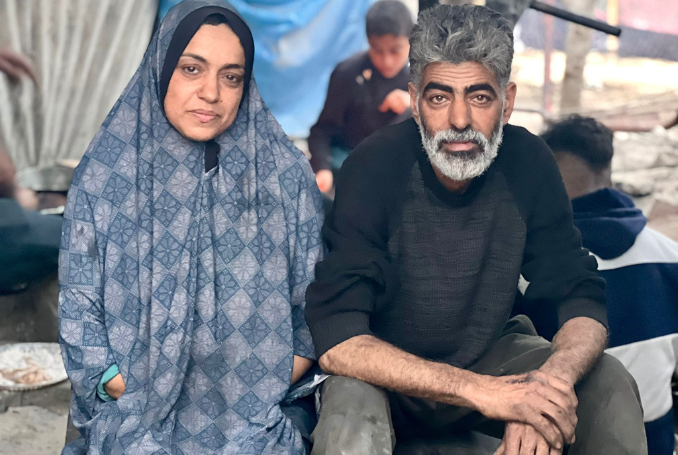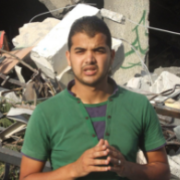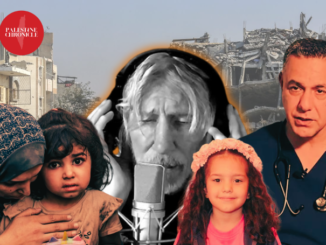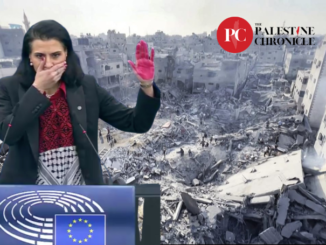
“When Israeli occupation forces invaded the Gaza Strip, the territory was divided into two halves, north and south, and we were separated as well”.
Six months of relentless bombardment on the Gaza Strip have killed and wounded over 110,000 people, displaced nearly two millions out of the 2.3 million inhabitants of the Strip, and destroyed most of Gaza’s residential buildings and infrastructure.
But there is one dire consequence of Israel’ genocidal war on Gaza that is rarely discussed: Many Palestinian families were divided and cannot be reunited under these horrific circumstances.
The Palestine Chronicle spoke with three people who were separated from the rest of their families throughout the 184 days of war. Their only hope is to be reunited with their beloved ones soon.
Two Halves
“I used to live with my family in the village of Al-Maghraqa, in central Gaza, on the northern border of Wadi Gaza. At the beginning of the war, my wife and children went to her family’s house in Gaza City out of fear of Israeli bombardment,” Lu’i Hajjee told The Palestine Chronicle.
“When Israeli occupation forces invaded the Gaza Strip, the territory was divided into two halves, north and south, and we were separated,” Hajjee continued.
“Currently, I am displaced in a tent in Deir Al-Balah, while my wife and children are still in Gaza City. I have no information about them as communications are almost cut off in Gaza City,” he said.
“I miss my three children and my wife. I cannot wait to be together, under one roof,” Hajee said, in tears.
“It’s been five months since I last saw them, five months without hearing my children’s voice. I can’t sleep thinking about them. I don’t even know if they were targeted by an Israeli bombardment.”
Hajee told us that he constantly follows the news to get some information.
“All I know is that they evacuated to my wife’s family home on Sahaba Street in central Gaza City. From the news, I learned that the area was subjected to heavy shelling, as Israeli airstrikes hit all areas in the Gaza Strip. I hope to reunite with my family and see them soon,” he said, with a voice that grew more desperate as he spoke.
No Answer
Umm al-Qasim al-Daia used to live in the Nuseirat camp, in central Gaza, since she got married, while her family lived on Thalatheeni Street in Gaza City.
After the war, she evacuated with her husband’s family to Deir Al-Balah, then returned to the Al-Nusairat camp about a month ago. Since the end of the temporary ceasefire, on December 1, she had no news about her family.
“My husband tries to calm me down, telling me that my family is fine, but I know he is lying to me, because he doesn’t know anything about them,” al-Daia said, in tears.
“I tried to call them, repeatedly, but there is no network in Gaza City, and I was not able to reach them,” she continued.
“Every time I call with no success, I break down in tears. My fear and concern for my family is indescribable. I pray to God every moment that they are safe.”
https://www.palestinechronicle.com/broken-ribs-this-is-what-happens-when-international-aid-is-dropped-over-gaza/
Hardest War
Youssef Kweik stayed in Gaza City as long as he could. He refused to leave the city where he was born and raised.
However, when the Israeli bombing intensified, Kweik’s wife decided to send their three daughters and their only son to her family house in Nuseirat, in central Gaza.
When the situation in Nuseirat worsened, they all evacuated to tents in Rafah city.
“I occasionally check on them, but it is not easy to communicate,” Kweik told The Palestine Chronicle.
“The phone network is unavailable in Gaza City while the internet is only available in limited areas. In any case, it is extremely weak,” he continued.
“I hope they are well in Rafah, although they live in tents. The cold is severe, and the rain poured heavily on the Gaza Strip last winter. I don’t know how they eat, drink, or sleep.”
Kweik knows that in the overpopulated city of Rafah there are no services, no food, and no medicine.
Killing the Kids While Searching for Their Mom’s Body – Israel’s Crimes Reach New Heights
“I fear for my children from these difficult living conditions. The occupation threatens to invade Rafah every day, and I’m worried about these threats. I don’t know where my wife will take my children if the occupation forces enter,” he continued.
“I hope the war ends soon, and I can reunite with my family. I miss hugging my children,” Kweik said in tears.
Kweik, however, wanted to let us know that he did not lose hope.
“This is the hardest war we’ve been through, but with our resilience, we will prevail, and we will overcome all these hardships,” he concluded.
(The Palestine Chronicle)

– Abdallah Aljamal is a Gaza-based journalist. He is a contributor for The Palestine Chronicle from the Gaza Strip. His email is abdallahaljamal1987@gmail.com







